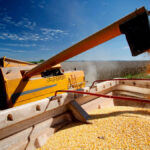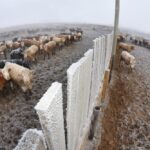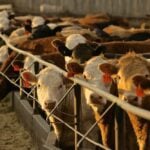Compared to last week, western Canadian yearling markets traded $5 lower to $3 higher while calves under 600 lbs. were $2 to as much as $7 higher. Yearlings were somewhat sluggish in the eastern Prairie regions, as feedlot operators in Alberta focused on local cattle. Fleshier backgrounded cattle are coming on the market at this […] Read more

Klassen: Deferred live cattle futures pull feeder market higher

North American soybean planting expected to rise
Prices and low stocks encouraging increased acres
During the final week of February, Ontario soybean prices were hovering around $17 per bushel, while elevator corn bids were slightly below $7 per bushel. Quick look Soybeans: Canadian soybean export and domestic use are both up over a year ago.Corn: Ethanol margins are higher, but processors seem to be well stocked.Wheat: Export values for […] Read more

Klassen: Steady demand supports feeder cattle prices
Compared to last week, western Canadian yearling prices were unchanged while calves were steady to $2 higher on average. Auction barns received larger supplies of backgrounded cattle and there was a fair amount of direct trade of yearlings off farm. Larger supplies of heavier-weight feeders appeared to limit the upside but there was no slippage. […] Read more

Klassen: Feeder cattle demand surges
Cow-calf producers already thinking spring
Compared to last week, western Canadian yearlings sold $3-$5 higher while calves traded $6 to as much as $10 higher. The return of moderate temperatures enhanced buying enthusiasm across the Prairies. Strength in deferred live cattle futures appeared to offset strong feed grain values. Yearling prices were rather soft through January and the first half […] Read more

Rains in Brazil delay soy harvest, support markets
The country is still expected to have a record soybean crop
According to Statistics Canada, total Canadian corn stocks as of Dec. 31 were 11 million tonnes, up from 10.7 million tonnes on Dec. 31, 2019. Total soybean stocks at the end of 2020 were estimated at 3.7 million tonnes, down from four million tonnes at year-end of 2019. Quick look Soybeans: Ontario soybean basis holding […] Read more

Klassen: Cold weather slows feeder cattle market activity
Compared to last week, western Canadian feeder cattle prices were relatively unchanged. Extreme temperatures blanketed Western Canada last week. Many auction barns cancelled sales or had limited numbers on offer. Buyers attended sales either in person or via the internet, which was supportive to the overall price structure. Many backgrounders and cow-calf producers delayed sales […] Read more

Klassen: Lower U.S. calf crop spurs buying interest
Compared to last week, western Canadian yearling markets traded steady to $2 higher; calves in the range of 550-800 lbs. were up $2-$4; and calves under 550 lbs. surged $4-$8 on average. Certain auction barns reported that grassers traded $8-$12 above week-ago levels. Colder temperatures caused some sellers to delay sales; however, there was no […] Read more

Market sends signals for more soybean acres
U.S. corn exports are running 131 per cent above last year
Earlier in January, the corn and soybean futures market incorporated a risk premium due to the uncertainty in South American production. This risk premium in the market is eroding due to recent precipitation and favourable weather forecasts. Quick look Soybeans: Farmers were regular sellers throughout the price rally. Corn: Ethanol demand for corn has declined […] Read more

Klassen: Feeder market bounces on optimistic outlook
Feed barley remains near historical highs
Compared to last week, western Canadian yearling prices traded $2-$4 higher; prices for mid-weight calves were quoted $4-$8 above week-ago levels. Calves under 550 lbs. traded $6 to as much as $10 higher compared to seven days earlier. Improving feedlot margins were the main factor driving the feeder market. June and August live cattle futures […] Read more

Klassen: Feeder cattle demand improving
The feeder market received a shot of adrenaline last week as corn futures came under pressure while live cattle futures surged. During the first half of the week, western Canadian yearlings were quite sluggish and calf prices steady to $3 lower compared to seven days earlier. Some yearling packages moving direct off-farm in certain areas […] Read more


